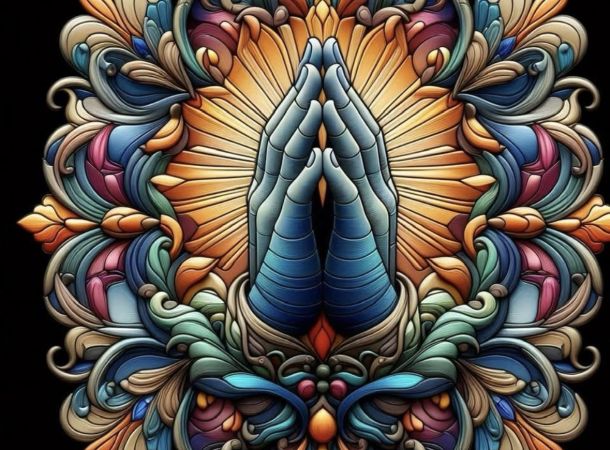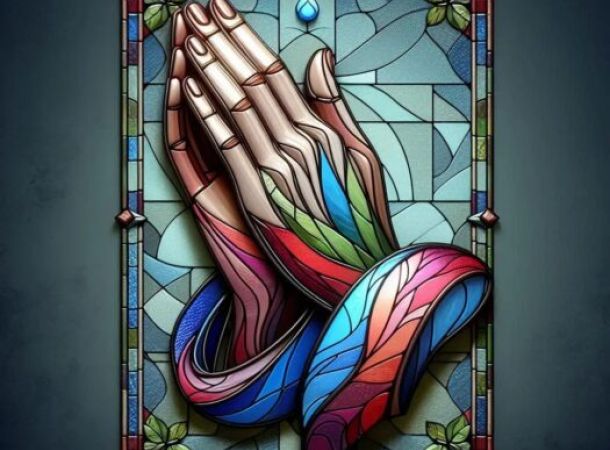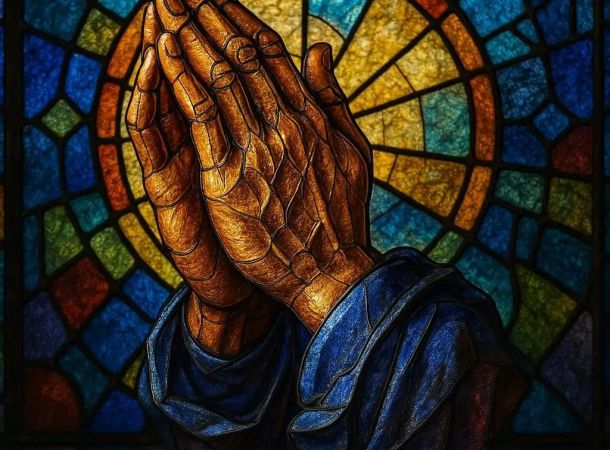Unforgiveness
Our last one-way chat was about what I believe to be the primary focus of the Bible, which is cleansing the human heart from deceit and crookedness. It is no happenstance, then, that the next Torah Portion in review is about Yom-Day Kippur-Covering, also known as the Day of Atonement, which is the Holiest day of the year. This particular portion is called Acharei Mot and includes Leviticus 16:1-18:30, the center of the Book of Leviticus. Many believe the Day of Atonement is the very heart of the Hebrew Scriptures.
We just explored the cleansing of a leper or unclean human through blood atonement, and now the blood of the atonement offering brings reconciliation to the nation of Israel, the High Priest, and the Priesthood. The word for atonement is kippur, which translates as a cover, ransom, purification, reconciliation, and forgiveness. The traditional idea is that the blood of the sacrifices appeases a bloodthirsty God who is vengeful and full of wrath. However, that idea does not align with what the Bible tells us. The Bible says that God so loved the world that He gave Yeshua. Atonement is not about appeasing a wrathful God but about His deep and abiding love for us and the hope and inspiration that forgiveness brings.
Because God loves all of His creation, He must separate the wicked from those who partner with Him to heal the world and not destroy it. Think about a parent whose job is keeping their children safe, provided for, and healthy. When some of your children continually hurt your other kids, steal from them, and cause them to feel unsafe, you want to keep them apart to minimize the harm. That is essentially what God does. He says, if you choose to keep hurting My children, then I will separate you from them in the world to come so that they can live in peace, safety, and provision. It is not coming from a sense of abusive authority but from love.
Sin creates an uncleanliness that keeps us from drawing near to the Holy One. Since every human has separated themselves from God’s Presence at one point or another, or many points, God provided an annual time when He gives a protocol for the High Priest to cover over any uncleanliness. This appointed time is the Day of Atonement. The High Priest atones for his sins and the sins of the community of Israel on this day. The ritual for cleansing a leper or unclean person is to bring two birds to the Priest, who kills one bird and sprinkles its blood on the other bird, which is given freedom and released onto the face of the land. The leper symbolizes an unclean human who is deceitful. Truth and mercy (Chen in Hebrew can translate as grace) cleanse us from iniquity or crookedness, according to Proverbs 16:6. The author of John tells us that Yeshua came to bring grace and truth. The bird whose shed blood allows the other bird to go free points us to Yeshua, whose blood atones for or cleanses us.
Proverbs 16:6: In mercy and truth, atonement is provided for iniquity; and by the fear of the Lord, one departs from evil.
John 1:14: Torah was given through Moses; grace and truth came through Yeshua, the Messiah.
Atonement sacrifices cleanse or purify the altar, the horns on the altar, and the Tabernacle of the Divine Presence. As human dwellings of the Holy Spirit, the sacrifice of Yeshua purifies us. Pure blood, symbolizing a pure heart full of truth, pure motives, intentions, will, and desires, purifies our earthly nature, the soul or nefesh, and water cleanses our spirit nature. Faith is when we trust that Yeshua’s goodness transfers to us somehow because we share the same Spirit.
Leviticus 16:18-19: And he shall go out to the altar that is before the Lord, and make atonement for it, and shall take some of the blood of the bull and some of the blood of the goat, and put it on the horns of the altar all around. Then he shall sprinkle some of the blood on it with his finger seven times, cleanse it, and consecrate it from the uncleanness of the children of Israel.
Hebrews 9:13-14: For if the blood of goats and bulls and the ashes of a heifer sprinkling those who have been defiled sanctify for the cleansing of the flesh, how much more will the blood of Messiah—who through the eternal Spirit offered Himself without blemish to God—cleanse our conscience from dead works to serve the living God?
In the Torah Portion in review, similar to the two birds used for cleansing a leper, two goats come before the High Priest, who kills one goat and releases the other into the wilderness. The High Priest places the blood of the sacrificial goat on the mercy seat in the Holy of Holies, which allows for a reconciliation between humanity and the Holy One. It allows for His Presence to stay in the Tabernacle even in the midst of uncleanliness. The Priest lays their hand on the goat and metaphorically transfers all of Israel’s sins onto the goat before taking its life. This idea points us to Yeshua, who John calls the Lamb of God, who takes away the world’s sins. In this context, He atones for us, as in He took our place. The world’s sins were symbolically placed on Him as He hung on a tree, allowing for the Divine Presence to live inside of us in the midst of uncleanliness. This act of sacrifice should fill us with gratitude and humility.
Leviticus 16:9-10: And Aaron shall bring the goat on which the Lord’s lot fell, and offer it as a sin offering. But the goat on which the lot fell to be the scapegoat shall be presented alive before the Lord, to make atonement upon it, and to let it go as the scapegoat into the wilderness.
John 1:29: The next day, John sees Yeshua coming to him and says, “Behold, the Lamb of God who takes away the sin of the world!
1 John 3:5: You know that Yeshua appeared in order to take away sins, and in Him there is no sin.
The blood symbolizes the earthly nature, also known as the Nefesh or the animalistic nature of humans. It includes our motives, aspirations, feelings, emotions, instincts, and intellect. Yeshua’s salvation came from the pureness of His blood, meaning He lived a life of love. If every choice we make in life boils down to stemming from love or fear, Yeshua chose love every time. Instead of feeding His earthly nature and doing whatever He wanted, He thought about you and me. He sacrificed His desires and wants for the greater good. When it came time to die, His blood was pure, or He was a perfect human. His earthly nature was pure because He never used it for selfish reasons. His blood was sanctified because every instinct was for the good of others and not personal survival. It’s wild to think about because our survival instincts are the strongest motivation of all time, and to use that drive for someone else’s good is near impossible! Yeshua goes above and beyond this and uses His earthly nature to protect and love His enemies, establishing an example of the atonement of forgiveness. The Yom Kippur sacrifice is when we surrender our earthly nature in trust and love to the Holy One so that our spirit nature can thrive.
It is fascinating that money and jewelry also atone “for our souls,” tying material goods to the feeding of our earthly natures. This understanding explains why pursuing money and God is impossible (Mt 6.24). Instead, these verses show us how to use our earthly gains for a holy purpose.
Num 31:50: We have brought an offering for the LORD, what every man found of ornaments of gold, armlets, and bracelets, and signet rings and earrings, and necklaces, to make an atonement for our [souls] before the LORD.
Exodus 30:16: And you shall take the atonement money of the children of Israel, and shall appoint it for the service of the tabernacle of meeting, that it may be a memorial for the children of Israel before the LORD, to make atonement for your [souls].
We have reviewed the covering of the atonement that purifies our souls, how it allows for a reconciliation between humans and God, and how the atonement sacrifice covers us as it takes our place. Now, we will talk about the greatest atoning covering of all time: forgiveness. Returning to the beginning, Adam and Chavah sinned, creating internal uncleanliness and a covering of shame. Their uncleanliness made them hide from the Holy One and unable to walk with Him as freely as they had before rebelling. God replaces their shameful garments with what I believe to be a garment of forgiveness. Scholars translate kippur as forgiveness fourteen times in the NKJV (Strong’s H3772). The Holy One forgives multitudes of sins because He loves us. Atonement is tied to forgiveness multiple times.
Leviticus 4:20: And he shall do with the bull as he did with the bull as a sin offering; thus he shall do with it. So the Priest shall make atonement for them, and it shall be forgiven them.
Two things can break us: rebellion and sin against the Holy One and other people’s sins against us. Humans betrayed, abandoned, slandered, falsely accused, and stole from Yeshua. He was sinned against in every way we are, yet He managed to stay whole-y or holy. He did this with a superpower called forgiveness. Before Yeshua, only God could forgive sins on the Day of Atonement. God gave Yeshua all authority in Heaven and Earth, and He used it to forgive (Mt 28.18). He did not use it for wrath or justice or power or anything other than mercy. He also gives us this same power. It says in Matthew 16:19 that whatever we bind or loosen on earth will be bound in heaven, and sometimes people attribute this to binding angels, but it is most likely talking about binding someone to wrath or forgiveness if we stay within context. When we forgive someone who wrongs us, it covers us so that their sin does not poke a hole in our soul or spirit, and it covers the other person by replacing their garment of shame with a garment of forgiveness.
Matthew 18:18: Amen, I tell you, whatever you forbid on earth will have been forbidden in heaven, and what you permit on earth will have been permitted in heaven.
John 20:23: If you forgive anyone’s sins, they are forgiven; but if you hold back, they are held back.
Forgiving someone does not require repair or trust, which must accompany accountability and repentance. Forgiving someone means you do not want someone who hurt you to suffer. You do not have ill will towards them, or you do not want revenge. Forgiveness is equal to loving your neighbor. On the other hand, Hatred is the desire for someone to feel the pain they have caused you. When the scriptures tell us to forgive someone 70 times 7, it is not saying for you to count how many times someone says sorry, and once they hit that 490 mark, you can start taking vengeance. Nor does this verse encourage us to lack wisdom and healthy boundaries. Instead, it is pointing us to something from the beginning. Lamech murdered a man and says, may the Lord avenge me 70 times 7, connecting 490 to vengeance (Gn 4.24). The Book of Daniel speaks about seven times seventy, bringing total forgiveness and reconciliation (Dn 9.24). Thanks to Dr. Dinah Dye for pointing this out in a community Bible study.
The Gematria is a book that has assigned a value to every Hebrew letter and, therefore, every Hebrew word. This type of study brings even more depth to the Hebrew Scriptures. I wondered what words had the value 490 and came across a brilliant one. The word for blameless is tammim and can mean whole, complete, perfected, or blameless, and it has a value of 490, which tells me that forgiving others keeps US perfect and blameless, not the other person. However, the Bible speaks of forgiveness as a covering, just like shame. It atones or covers us and others with love. Therefore, to forgive someone 70 times 7 speaks of completely forgiving them, with no strings attached, which keeps us tammim or whole when others hurt us.
1 Peter 4:8: Above all, keep your love for one another constant, for “love covers a multitude of sins.”
Psalm 32:1: A Psalm of David. A contemplation. Blessed is he whose transgression is forgiven, whose sin is covered.
All in all, atonement is a term that refers to the Holy One providing a substitute for us that takes upon Himself all of our ugly and nails it to a tree so that we can go free. This freedom should help us live an abundant life of love, gratitude, and forgiveness. Seeing how a blanket of forgiveness has covered us, we should freely cover others, knowing we are all fighting internal demons. May we allow the grace and truth of Yeshua to cleanse our hearts so we can lift our souls to the Holy One as an offering. We love because He first loved us. We forgive because He first forgave us.
Psalm 51:1: Have mercy upon me, O God, according to Your lovingkindness; According to the multitude of Your tender mercies, blot out my transgressions. Wash me thoroughly from my iniquity, and cleanse me from my sin.
1 John 4:19: We love because He first loved us.
The enemy in this portion is unforgiveness because the Bible says that when we withhold forgiveness from someone, He will withhold it from us. This is an example of a clear cause and effect. We have been given the authority to forgive others for their wrongs against us and we have free will on how we use it. This is the only thing that I can find that keeps us from being forgiven by the Holy One.
Matthew 6:14-15: For if you forgive others their transgressions, your heavenly Father will also forgive you. But if you do not forgive others, neither will your Father forgive your transgressions.




Leave a Reply